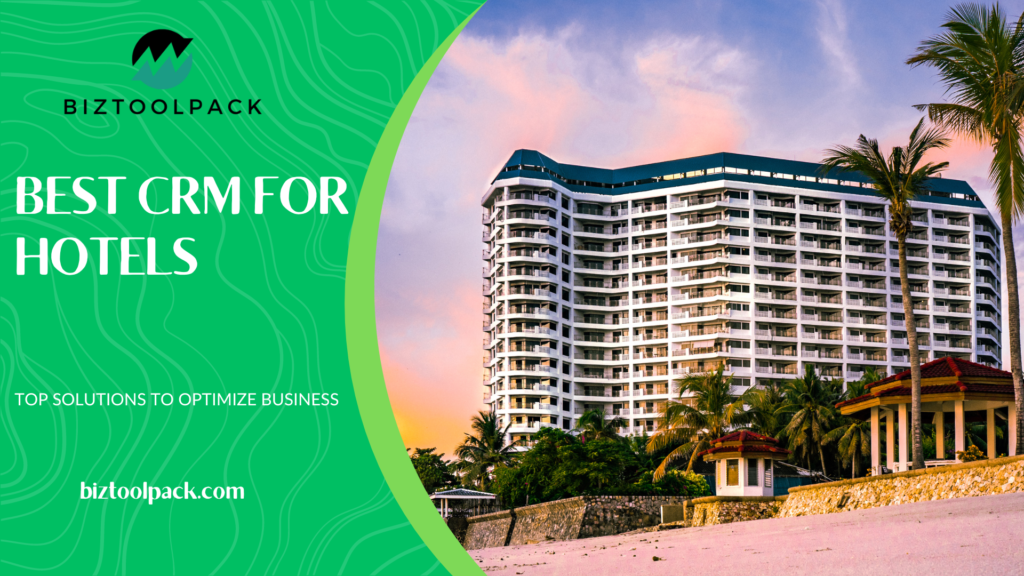Did you know that businesses using a CRM system experience a 29% increase in sales? In today’s competitive landscape, managing customer relationships effectively is not just an advantage—it’s a necessity. As a seasoned CRM expert, I’ve witnessed firsthand how the right Customer Relationship Management (CRM) system can transform businesses, streamline operations, and significantly enhance customer satisfaction. This article delves into the best CRM for hotels, offering a comprehensive comparison of top solutions tailored to meet the unique needs of the hospitality industry.
Selecting the right CRM is pivotal for achieving business success. It impacts customer retention, operational efficiency, and ultimately, your bottom line. In this guide, we’ll explore the essential features to look for in a CRM, review the top CRM solutions for hotels, and provide actionable steps to help you choose the best fit for your business. Whether you’re a boutique hotel or a large chain, finding the optimal CRM can propel your business to new heights.
What to Look for in a CRM for Your Business
One of the most critical factors when selecting a CRM is scalability. As your hotel business grows, so will your data and user demands. A scalable CRM ensures that your system can handle an increasing number of bookings, customer interactions, and data without compromising performance. Look for solutions that offer flexible pricing plans, robust data management capabilities, and the ability to add more users seamlessly. This ensures that your CRM will grow alongside your business, providing consistent support regardless of your expansion.
A CRM system is only as good as its usability. An intuitive interface and straightforward onboarding process are essential, especially for small teams or those new to CRM systems. A user-friendly CRM minimizes the learning curve, allowing your staff to quickly adapt and utilize the system effectively. Features such as drag-and-drop functionality, customizable dashboards, and comprehensive training resources can significantly enhance the user experience. When evaluating CRMs, consider requesting a demo or trial period to assess the ease of use firsthand.
Every hotel has unique workflows and requirements. A one-size-fits-all CRM may not address the specific needs of your business. Therefore, customization is a vital aspect to consider. The best CRM solutions offer customizable features that allow you to tailor the system to your hotel’s specific processes. This includes customizable fields, workflows, and reporting tools. Additionally, the ability to integrate with other software—such as property management systems (PMS), booking engines, and marketing platforms—can enhance the functionality of your CRM, providing a seamless operational experience.
6 Best CRM Solutions for Hotels
When it comes to selecting the best CRM for hotels, several options stand out due to their robust features, scalability, and industry-specific capabilities. Here are the top six CRM solutions tailored for the hospitality sector:
1. HubSpot CRM
HubSpot CRM is a powerful, user-friendly platform designed to help businesses manage customer relationships and streamline their sales and marketing processes. Known for its robust features and seamless integration capabilities, HubSpot is particularly beneficial for businesses looking to enhance their customer engagement and data management.
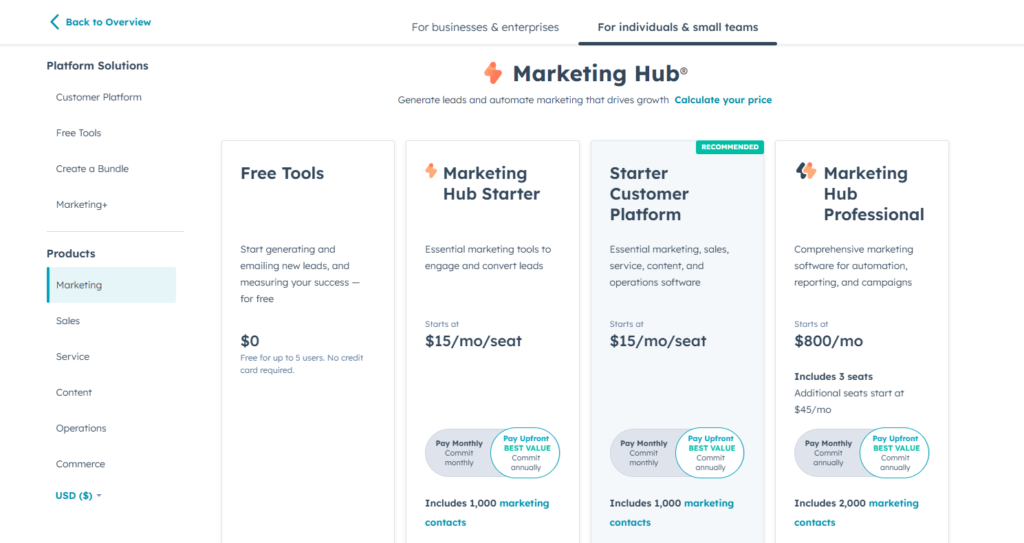
Key Features:
- Contact Management: Efficiently organize guest information and track interactions, ensuring personalized communication for better guest experiences.
- Email Marketing: Create, schedule, and automate marketing emails to keep guests informed about promotions, events, and booking reminders.
- Sales Pipeline Management: Visualize and manage sales processes effectively, helping hotel staff track inquiries and bookings from initial contact to final confirmation.
- Live Chat and Chatbots: Engage with potential guests in real-time through live chat, enhancing responsiveness and guest satisfaction.
- Custom Reporting and Analytics: Generate reports to analyze booking trends, campaign performance, and customer behavior, facilitating data-driven decisions.
- Integration with Other Tools: Connect seamlessly with various hotel management systems, booking engines, and third-party applications for a streamlined workflow.
- Task Automation: Automate repetitive tasks such as follow-up reminders and lead assignments to improve operational efficiency.
Pricing:
- Free Plan: $0 for core features
- Starter: $15/month
- Professional: $800/month
- Enterprise: $3,600/month
Small to medium-sized hotels and larger hotel chains that want to enhance their marketing and sales efforts. HubSpot CRM is especially suitable for hotels focused on inbound marketing strategies and personalized guest engagement to drive bookings and improve customer loyalty.
2. Pipedrive CRM
Pipedrive is a sales-focused CRM designed to streamline sales processes and help businesses manage leads and customer relationships effectively. It’s ideal for teams looking for a simple yet powerful tool to improve conversions, automate tasks, and provide deep insights into sales performance.
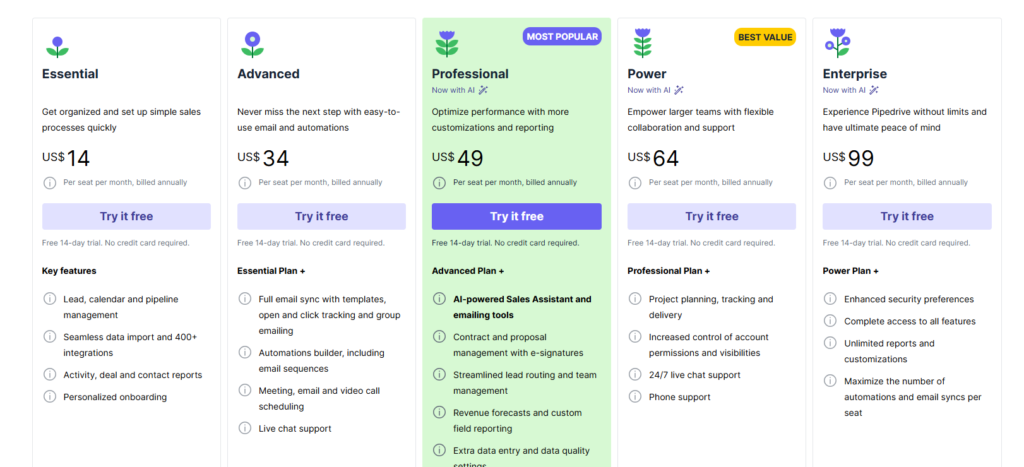
Key Features:
- Visual Sales Pipeline: Easily track the stages of your sales deals in a visually appealing and user-friendly pipeline.
- Lead and Deal Management: Manage all your hotel inquiries, leads, and deals in one place, ensuring that no potential guest inquiry is missed.
- Email Integration: Automatically sync all email conversations with guests to keep communications in one place.
- Task Automation: Automate repetitive tasks, like follow-up emails or booking reminders, reducing manual workload for hotel staff.
- Mobile App: Access guest information, deals, and tasks on-the-go with a fully-functional mobile app.
- Customizable Dashboards: Get detailed insights into your hotel’s performance with easy-to-build reports.
- Third-Party Integrations: Connect Pipedrive with your booking systems, email platforms, or accounting software.
Pricing:
- Essential Plan: $14/month per user
- Advanced Plan: $34/month per user
- Professional Plan: $49/month per user
- Power Plan: $64/month per user
- Enterprise Plan: $99/month per user
Small to mid-sized hotels that need a simple yet powerful CRM to manage guest inquiries, optimize their sales process, and improve conversion rates. Ideal for hotels that handle both direct bookings and partnerships with travel agencies and need a tool to track these relationships
3. Zoho CRM
Zoho CRM is a flexible, cloud-based customer relationship management platform that offers a wide range of tools for managing sales, marketing, and customer support. It’s designed to help businesses automate processes, engage with customers, and increase revenue. With its scalability and customization, Zoho CRM is suitable for various industries, including hospitality.
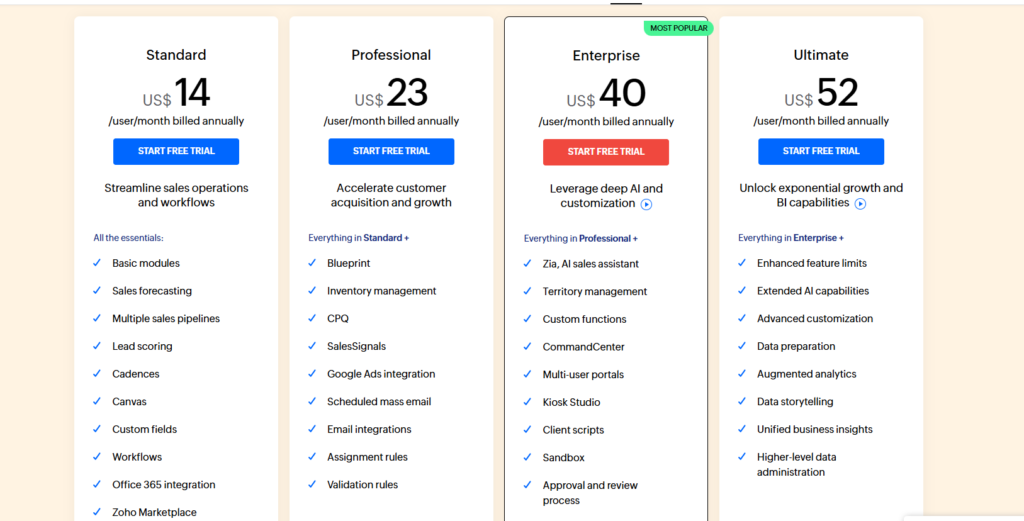
Key Features:
- Lead and Contact Management: Manage guest inquiries, reservations, and follow-ups, ensuring no potential booking is overlooked.
- Automated Workflows: Streamline repetitive tasks like reservation confirmations, guest feedback requests, and follow-up emails, saving hotel staff valuable time.
- Omnichannel Communication: Engage with guests via email, phone, live chat, and social media, all from a single platform.
- AI-Powered Sales Assistant (Zia): Offers suggestions for the best times to contact leads, predicts deal closures, and identifies sales anomalies, helping hotels improve bookings.
- Customizable Dashboards and Reports: Generate tailored reports on booking trends, revenue forecasts, and guest engagement.
- Third-Party Integrations: Seamlessly integrates with hotel management systems (PMS), accounting software, and booking platforms for better data flow.
- Mobile App: Access Zoho CRM from anywhere, allowing hotel managers to manage guests and reservations on the go.
Pricing:
- Free Plan: Limited features for up to 3 users
- Standard Plan: $14/month per user
- Professional Plan: $23/month per user
- Enterprise Plan: $40/month per user
- Ultimate Plan: $52/month per user
Small to large hotel chains that need a highly customizable CRM solution to manage guest relationships, optimize reservations, and improve operational efficiency. Zoho CRM is ideal for hotels looking to leverage AI and automation to enhance guest engagement and increase booking conversions.
4. Keap CRM
Keap is an all-in-one CRM and marketing automation platform designed to help businesses manage customer relationships, streamline marketing efforts, and enhance sales processes. With its user-friendly interface and powerful automation capabilities, Keap is particularly suitable for small to mid-sized businesses, including those in the hospitality sector.
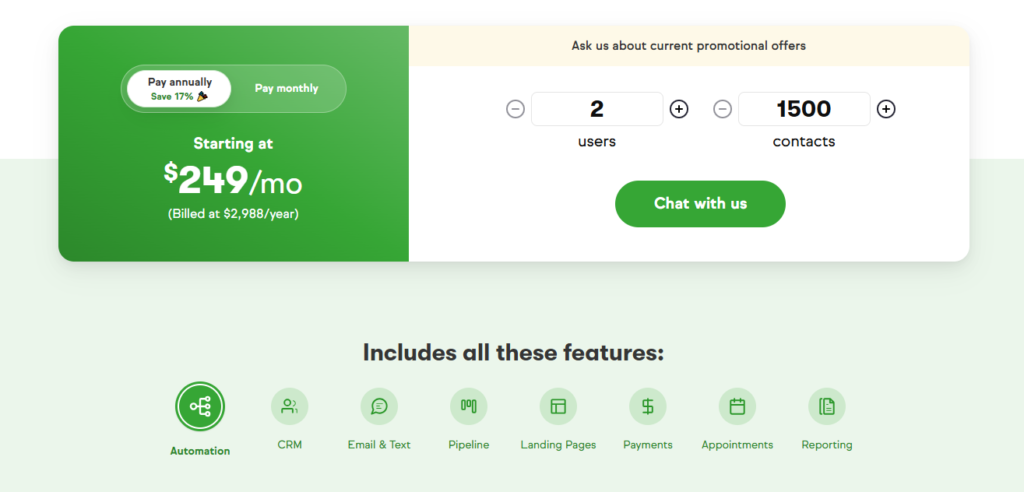
Key Features:
- Contact Management: Organize and manage guest information, preferences, and past interactions, ensuring personalized service and follow-ups.
- Marketing Automation: Automate marketing campaigns, such as email follow-ups, booking reminders, and promotional offers, enhancing guest engagement.
- Sales Pipeline Management: Visualize and track the stages of guest inquiries and bookings, helping hotel staff manage leads more effectively.
- Task Automation: Set up automated tasks for follow-ups and reminders, reducing manual workload for hotel staff and ensuring timely communication with guests.
- Integrated Payments: Process payments directly within the platform, simplifying the booking and payment process for guests.
- Reporting and Analytics: Gain insights into booking trends, guest interactions, and marketing campaign performance, allowing for data-driven decisions.
- Mobile App: Access guest data, manage tasks, and communicate with guests on the go, enhancing operational flexibility.
Pricing:
- $249/month for up to 1,500 contacts and 2 users.
Small to mid-sized hotels or boutique hotels that require a comprehensive solution for managing guest relationships and marketing efforts. Keap is ideal for hotel businesses focused on personalization and automation to enhance guest experience and increase repeat bookings.
5. Salesforce CRM
Salesforce CRM is a leading cloud-based customer relationship management platform that offers comprehensive solutions for managing customer interactions, sales processes, and marketing campaigns. Known for its scalability and extensive customization options, Salesforce is designed to cater to businesses of all sizes, making it suitable for complex industries, including hospitality.
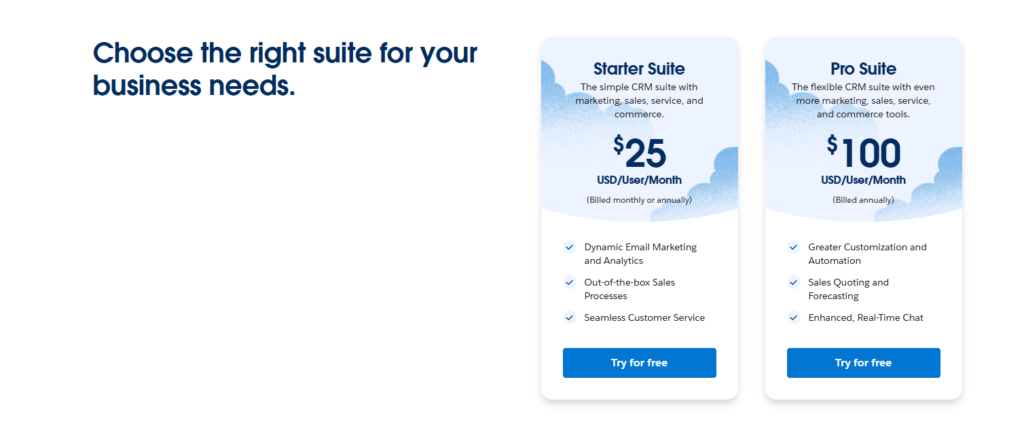
Key Features:
- Lead and Opportunity Management: Efficiently track potential guests and opportunities, allowing hotel staff to manage inquiries and bookings through a streamlined process.
- Customizable Dashboards and Reports: Generate detailed reports on guest preferences, booking trends, and sales performance, enabling data-driven decision-making.
- Marketing Automation: Automate marketing campaigns, including email promotions and personalized offers, to engage guests effectively and drive bookings.
- AI-Powered Insights (Einstein): Leverage AI analytics to gain insights into customer behavior, predict trends, and optimize marketing strategies for better guest engagement.
- Mobile Accessibility: Access guest information and manage tasks from anywhere with the Salesforce mobile app, enhancing operational flexibility for hotel staff.
- Integration Capabilities: Seamlessly integrate with various hotel management systems, booking engines, and third-party applications for enhanced data flow.
- Collaboration Tools: Utilize tools like Chatter for internal communication, ensuring that hotel teams work together efficiently to enhance guest experiences.
Pricing:
- Essentials: $25/month per user
- Professional: $75/month per user
- Enterprise: $150/month per user
- Unlimited: $300/month per user
Large hotels, hotel chains, and hospitality groups that require a robust and highly customizable CRM solution. Salesforce CRM is particularly beneficial for hotels looking to manage complex guest interactions, analyze customer data at scale, and implement comprehensive marketing strategies to boost occupancy and guest satisfaction.
6. Microsoft Dynamics 365 CRM
Microsoft Dynamics 365 CRM is a versatile, cloud-based customer relationship management solution that integrates seamlessly with other Microsoft applications. It offers a comprehensive suite of tools for managing sales, customer service, and marketing, making it suitable for various industries, including hospitality. Its flexibility and customization capabilities allow hotels to tailor the CRM to meet their specific needs.
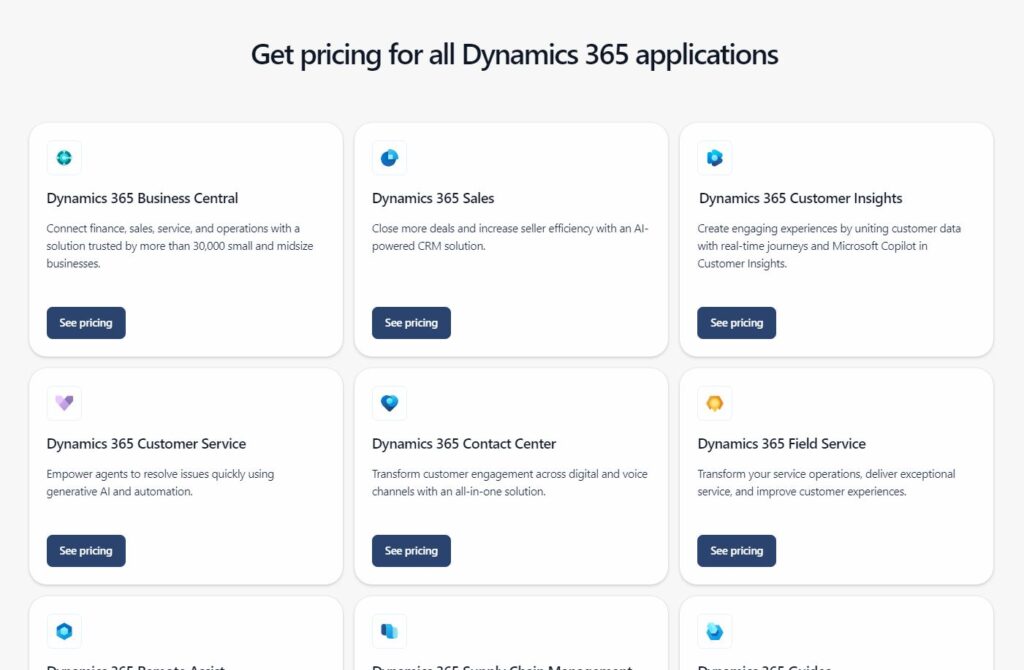
Key Features:
- Customer Insights: Gain a 360-degree view of guests through integrated data, enabling personalized service and targeted marketing strategies.
- Sales Automation: Streamline the booking process and manage leads effectively, allowing hotel staff to focus on closing deals and enhancing guest experiences.
- Marketing Automation: Create and manage marketing campaigns across multiple channels, ensuring consistent communication and engagement with potential guests.
- Field Service Management: Coordinate maintenance and service requests, ensuring that hotel facilities are always in top condition for guests.
- AI-Driven Analytics: Utilize AI and machine learning to analyze customer behavior, forecast trends, and improve decision-making processes.
- Integrated Collaboration Tools: Leverage Microsoft Teams and other collaboration features for seamless communication among hotel staff, enhancing teamwork and efficiency.
- Mobile Accessibility: Access the CRM on-the-go with mobile applications, allowing hotel staff to manage operations and respond to guest inquiries from anywhere.
Pricing:
- Sales Professional: $65/month per user
- Sales Enterprise: $95/month per user
- Customer Service Professional: $50/month per user
- Customer Service Enterprise: $95/month per user
- Marketing: $1,500/month for up to 10,000 contacts
Mid-sized to large hotels and hospitality groups that require a robust and customizable CRM solution. Microsoft Dynamics 365 is ideal for hotels looking to enhance operational efficiency, improve guest engagement, and leverage advanced analytics for data-driven decision-making. Its integration capabilities also make it suitable for hotels already using Microsoft products.
Each of these CRMs offers unique strengths that cater to different aspects of hotel management, from guest engagement and sales automation to comprehensive data analytics and integration capabilities.
Which CRM is Best for Your Hotel?
After evaluating the top CRM solutions, Pipedrive CRM emerges as the best CRM for hotels. Its extensive customization options, powerful integration capabilities, and robust scalability make it an ideal choice for hotels of all sizes. Salesforce’s comprehensive suite of tools not only enhances customer relationship management but also provides valuable insights through advanced analytics, enabling data-driven decision-making.
Use Case Recommendations
- Boutique Hotels: HubSpot CRM is an excellent choice for smaller establishments due to its ease of use, affordability, and strong marketing automation features.
- Large Hotel Chains: Pipedrive CRM offers extensive scalability and integration capabilities, making it suitable for large-scale operations with complex requirements.
- Mid-Sized Hotels: Zoho CRM provides a balanced mix of customization, affordability, and comprehensive features, catering well to mid-sized hotel businesses.
Next Steps
Ready to transform your hotel’s customer relationship management? Start by signing up for a free trial of the recommended CRM solutions to experience their features firsthand. Alternatively, schedule a demo with a CRM provider to discuss your specific needs and see how their system can be tailored to meet your business objectives. Taking these actionable steps will help you make an informed decision and select the best CRM for your hotel.
How to Choose a CRM: A Beginner’s Buying Guide for Hotels
Selecting the right CRM for your hotel can seem daunting, especially if you’re new to CRM systems. Here’s a step-by-step guide to help you navigate the process:
Identify Your Business Needs
Start by assessing your hotel’s specific requirements. Consider factors such as the size of your property, the number of guests you handle, and the complexity of your operations. Identify the key areas where a CRM can add value, such as guest management, booking automation, marketing campaigns, or data analytics.
Evaluate Essential Features
Based on your identified needs, list the essential features you require in a CRM. Common features for hotels include:
- Guest Profiles: Comprehensive databases that store guest information, preferences, and history.
- Booking Integration: Seamless integration with your booking engine and PMS.
- Marketing Automation: Tools for email campaigns, social media management, and personalized marketing.
- Analytics and Reporting: Advanced reporting capabilities to track performance metrics and guest behavior.
- Mobile Access: Accessibility on mobile devices for on-the-go management.
Consider Budget Constraints
Determine your budget for a CRM system. While investing in a robust CRM can yield significant returns, it’s essential to find a solution that offers the best value within your financial constraints. Compare pricing structures, including subscription fees, setup costs, and any additional charges for extra features or users.
Assess Customer Support
Reliable customer support is crucial, especially during the initial setup and onboarding process. Ensure that the CRM provider offers comprehensive support, including tutorials, live chat, phone support, and dedicated account managers. Good customer support can significantly reduce downtime and enhance your overall experience with the CRM.
Test with a Free Trial
Before committing to a CRM, take advantage of free trials or demo versions. This allows you to explore the system’s functionalities, assess its usability, and ensure it meets your expectations. Encourage your team to participate in the trial to gather diverse feedback and make a well-informed decision.
Check for Integration Capabilities
Ensure that the CRM can integrate seamlessly with your existing software and tools. Integration with your PMS, booking engine, accounting software, and marketing platforms can enhance the efficiency of your operations and provide a unified view of your business processes.
Review Security Features
Data security is paramount when managing guest information. Verify that the CRM adheres to industry-standard security protocols, including data encryption, regular backups, and compliance with regulations such as GDPR. A secure CRM safeguards your data and builds trust with your guests.
Conclusion
Selecting the best CRM for hotels is a strategic decision that can significantly impact your business’s success. From enhancing customer relationships and boosting sales to streamlining operations and providing valuable insights, a robust CRM system is an invaluable asset for any hotel. By understanding your business needs, evaluating key features, and considering factors like scalability, ease of use, and customization, you can choose a CRM that aligns with your long-term goals and drives your hotel towards sustained growth.
When choosing a CRM, always consider not just your current needs but also your future growth plans. A scalable and adaptable CRM will support your business as it evolves, ensuring that you continue to deliver exceptional guest experiences and maintain a competitive edge in the hospitality industry.
FAQs
1. Do I really need a CRM?
Absolutely. A CRM system centralizes customer data, streamlines communication, enhances marketing efforts, and improves overall operational efficiency. For hotels, this means better guest experiences, increased loyalty, and higher revenue.
2. How secure is my data in a CRM?
Reputable CRM providers implement robust security measures, including data encryption, secure servers, regular backups, and compliance with data protection regulations like GDPR. Always choose a CRM that prioritizes data security to protect your guests’ information.
3. Can a CRM integrate with my existing tools?
Most modern CRMs offer extensive integration capabilities with popular property management systems (PMS), booking engines, accounting software, and marketing platforms. This ensures a seamless flow of data across your business operations.
4. What is the cost of implementing a CRM system?
The cost varies based on the CRM’s features, the number of users, and the level of customization required. Pricing models typically include subscription fees, setup costs, and potential additional charges for premium features. It’s essential to evaluate the total cost of ownership and choose a CRM that offers the best value for your investment.
5. How long does it take to set up a CRM?
Setup time depends on the complexity of the CRM and the level of customization required. On average, implementing a CRM can take anywhere from a few days to several weeks. Providers often offer onboarding support to expedite the setup process and ensure a smooth transition.
6. Can a CRM help increase my hotel’s sales?
Yes, a CRM can significantly boost sales by automating marketing campaigns, improving lead management, enhancing customer segmentation, and providing actionable insights through data analytics. This leads to more effective sales strategies and higher conversion rates.
7. Is a CRM suitable for small hotels?
Absolutely. There are CRM solutions specifically designed for small hotels that offer essential features at an affordable price point. These systems can help small hotels manage their customer relationships efficiently and compete effectively with larger establishments.
8. What features should I prioritize in a CRM for hotels?
Prioritize features such as guest profiles, booking integration, marketing automation, analytics and reporting, and mobile access. These functionalities directly impact your ability to manage guest relationships, streamline operations, and drive sales.
9. Can a CRM improve customer retention?
Yes, a CRM enhances customer retention by enabling personalized communication, timely follow-ups, and tailored marketing efforts. By understanding and anticipating guest needs, you can foster loyalty and encourage repeat business.
10. What support options should I look for in a CRM provider?
Look for CRM providers that offer comprehensive support options, including live chat, phone support, email support, detailed documentation, and training resources. Some providers also offer dedicated account managers to assist with your specific needs.
I’m Palash Pramanik, an SEO and CRM expert with a deep passion for helping businesses thrive online. I specialize in driving higher search engine rankings and creating seamless customer relationship management strategies to enhance both visibility and engagement. Whether you need to boost your online presence, attract the right audience, or streamline your client interactions, I offer tailored solutions designed to meet your specific needs. My goal is to help you optimize your digital strategy, strengthen customer connections, and drive sustainable growth. Let’s work together to elevate your business to new heights!

